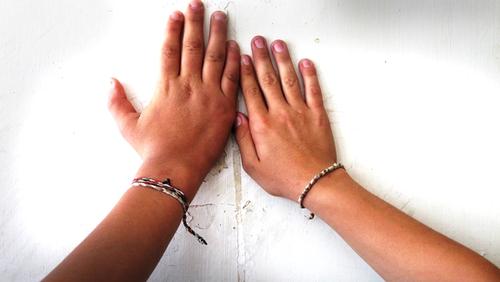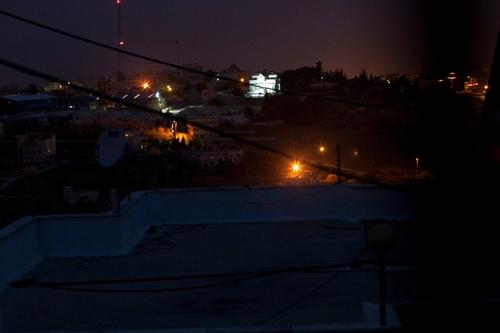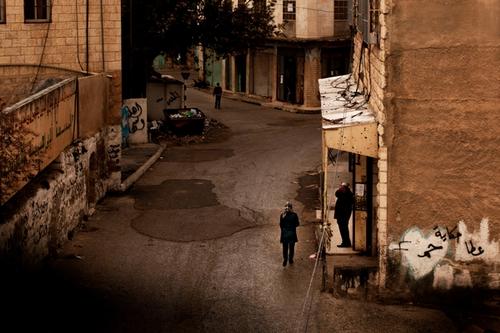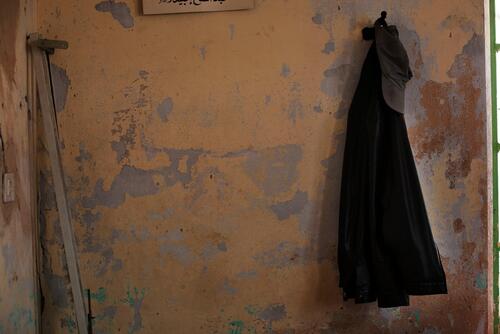Hussein and Ziad keep the bracelets that the inmates made for them while they were in prison. They are 15 and 14 years old. Hussein and Ziad, 15 and 14 years old, are cousins. They live in Silwan, a neighbourhood in conflict in East Jerusalem, adjacent to the Old City and the revered Al-Aqsa Mosque. The more than 30,000 Palestinians who live here face the constant threat of house demolitions, Jewish settlers’ encroachment and a plan from the municipality to convert part of the neighbourhood (Al-Bustan) into a national park, referred to as King David’s Garden.
The only place to talk to Hussein and Ziad is at at Hussein’s house. Hussein can’t go out. If he does, there will be even more trouble for him as he is under home detention. Hussein and Ziad were arrested a couple of years ago, with four other young people. They were charged with serious offences: attempting to stab a settler, throwing Molotov cocktails, and stone throwing, among others. “You name it, it was a long list,” says Ziad, “taking into account that we did nothing of the sort.”
After their arrest, they were sent to prison: Ziad, for four days, Hussein, for two weeks. When released, Hussein was sentenced to a period of six months of home detention. For a while he was forced to live at an aunt’s house. By his own account, that was, his worst period. He couldn’t go to school or see his friends.
“I was just sitting in the house, browsing the internet, watching TV. Nothing else,” says Hussein, a tall boy who nonchalantly keeps a constant eye on his cellphone to check his Facebook page for updates. He is shy and cocky at the same time, a difficult combination that only teenagers know how to perfect. He says that now that he is back with his parents the situation has improved, and he has been allowed to go back to school. “I’ve missed too many classes and I can’t catch up. I mainly stare at the blackboard. But after all, I don’t want to go to school, I just want to work.”
Ziad, shorter and burlier, looks at his cousin and nods, with a “me too, and the sooner the better” expression on his face. They are kids playing adults. According to MSF’s psychologists, many of the children arrested, imprisoned or under home detention end up dropping out of school, a “lucky” some taking on menial jobs for a very low salary, without any future,
After serving the customary tea and cold drinks for the visitors, Hussein’s mother sits with the translator, journalist and the two boys in their modest living room. Silent and preoccupied, she smiles vaguely at her son’s remarks and often looks at the picture that dominates the room: her first-born son, Ziad’s brother, is still in prison.
Since his release, Hussein has been receiving care from staff at the mental health project that MSF recently opened in East Jerusalem. According to the psychologist, he was hyperactive, aggressive and had flashbacks about his detention by the police. The treatment, in concert with a return to his parents’ house, where he feels much safer, has improved in his condition. He boasts about school, “Our schoolmates told us yesterday that they missed us a lot, that we are good friends, that we have become better.” Prison seems to them a rite of passage, and means an instant upgrade in status.
However, asked if the rest of the students see them as heroes, the answer is sharp, immediate: “Not at all, on the contrary, many of our classmates have already gone to prison, nothing new there.” Hussein says: “Prison was not bad. My brother was there, the prisoners took good care of me. It was very crowded, but later they put us in a cell for eight people. We got up at five in the morning for counting and searching. If you were not up and ready they hit you. We did have some classes. Math and also painting. We only painted about how we love Silwan, how we love Palestine.”
Playing football is their thing. But if asked what object they value the most, both kids do not hesitate for a second and they raise their arms: on their wrists, two thin bracelets, braided threads. “The prisoners made them for us. They gave them to us when we were about to be released. They make them with frayed towels.” Are they afraid of going back to prison? Of facing the judge? “No,” they say, “we didn’t do anything wrong. Besides, here it’s normal.”
MSF has detected a substantial increase in the number of minors treated at their programs in Hebron – half of all patients – and in East Jerusalem. Children are direct or indirect witnesses of the conflict: family members or even children themselves are detained (at 12 years old children can go to prison and from 16 they are treated as adults); settler confrontations; movement restrictions by the army; and internal fighting among Palestinian groups. It all takes its toll.
Many children suffer from isolation, night terrors, being constantly on alert and aggressive behaviour. They may wet their beds or their language or behaviour may change. The constant tension can also cause physical problems like fatigue, aches and pains, sleeping difficulties and loss of appetite. These natural reactions may feel overwhelming to the children and their families and, if not treated in time, may have an irreversible impact on the child’s development.
Occupied Minds is a series of stories about Médecins Sans Frontières (MSF) patients affected by the Israeli-Palestinian conflict, people receiving assistance from MSF mental health teams in Hebron and in East Jerusalem. The stories are collected by the MSF teams. Occupied Minds seeks to reflect the reality of daily life under occupation for MSF patients and the people who treat them.






